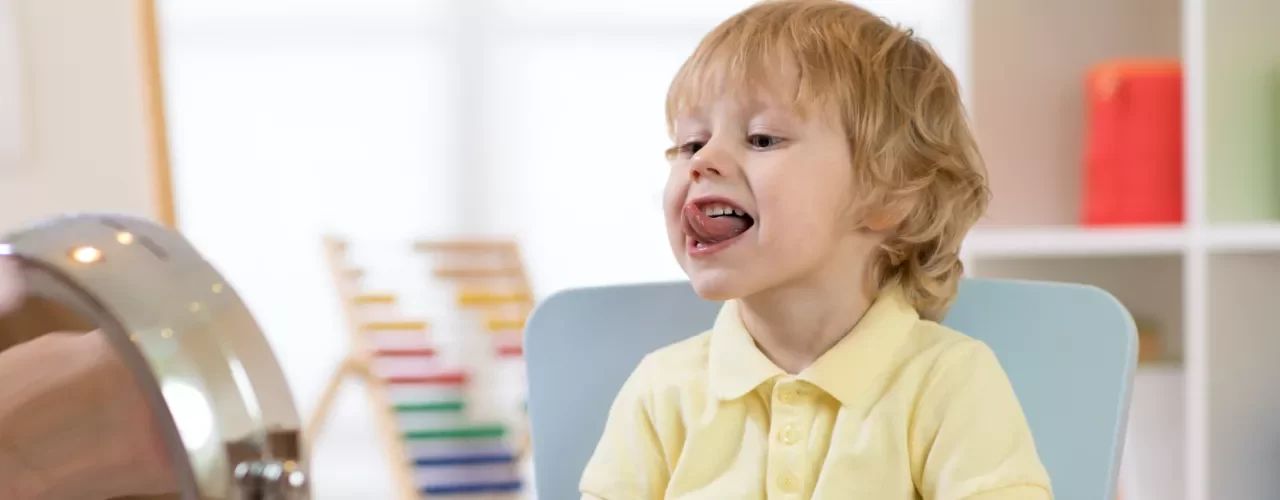Articulation/Phonological Disorder/Lisp

What Are Speech Sound Disorders?
When a child experiences a speech sound disorder, it can have a significant impact on their ability to communicate effectively with others. These disorders can range from minor difficulties with specific sounds to more severe challenges with overall speech patterns. We have the experience and expertise needed to help children overcome these challenges and improve their communication skills.
The approach we use to treat speech sound disorders is based on a comprehensive understanding of the unique needs of each child. Through a combination of personalized therapy and targeted exercises, we work to address the underlying causes of the disorder and help children develop the skills they need to speak clearly and confidently. We are able to provide ongoing support and guidance to ensure that progress is maintained over time.
What Are Some Signs Of An Articulation Disorder?
When it comes to speech disorders, an articulation disorder is one of the most common. This type of disorder involves difficulties making sounds, which can include substituting, leaving out, adding, or changing sounds. These errors can make it challenging for others to understand what the person is saying, leading to communication difficulties that can impact daily life.
While it is common for young children to make speech errors, these errors should begin to decrease as they develop and grow. If a child continues to make these errors beyond the expected age, it may be an indication of an articulation disorder. We have extensive experience in identifying these disorders and developing personalized treatment plans to help children improve their communication skills.
It is important to note that not all sound substitutions and omissions are indicative of a speech disorder. Some may be related to a specific dialect or accent. However, it is essential to seek a professional evaluation if you have concerns about your child’s speech development. By working with a qualified speech therapist, you can receive a comprehensive assessment of your child’s speech and develop an effective treatment plan tailored to their specific needs.
At Therapy Care, we believe in a collaborative approach to speech therapy. We work closely with parents and caregivers to ensure that treatment goals are aligned with the child’s needs and that progress is consistently monitored and evaluated. With our expertise in speech disorders and our dedication to providing the highest quality care, we are confident that we can help your child improve their communication skills and achieve their full potential! To see the age range during which most children develop each sound, visit these websites:
https://www.asha.org/public/speech/disorders/speech-sound-disorders/
www.talkingchild.com/speechchart.html.
What Are Some Signs Of A Phonological Disorder?
A phonological process disorder involves patterns of sound errors. For example, substituting all sounds made in the back of the mouth like “k” and “g” for those in the front of the mouth like “t” and “d” (e.g., saying “tup” for “cup” or “das” for “gas”).
Another rule of speech is that some words start with two consonants, such as broken or spoon. When children don’t follow this rule and say only one of the sounds (“boken” for broken or “poon” for spoon), it is more difficult for the listener to understand the child. While it is common for young children learning speech to leave one of the sounds out of the word, it is not expected to continue as a child gets older. If a child continues to demonstrate such cluster reduction, he or she may have a phonological process disorder.
How Are Speech Sound Disorders Diagnosed In Batavia?
When it comes to diagnosing speech disorders, a speech-language pathologist (SLP) is the go-to professional. Through a combination of careful listening and formal testing, the SLP is able to evaluate both children and adults who are experiencing speech and language difficulties.
During the evaluation, the SLP will listen carefully to the person’s speech patterns and may use a formal articulation test to record any sound errors that are present. Additionally, an oral mechanism examination will be conducted to determine whether the nerves and muscles of the mouth are functioning as they should.
If the SLP determines that a speech disorder is present, they will typically recommend speech treatment to help the individual improve their speech production. For children, a comprehensive evaluation is often completed to assess their language development and determine their overall communication functioning.
We take a personalized approach to diagnosing speech disorders. We understand that each individual is unique, and we tailor our evaluation process to meet the specific needs of each person we work with. Through careful listening, observation, and formal testing, we are able to diagnose speech disorders accurately and efficiently and recommend effective treatment strategies that are tailored to the individual’s unique needs.
Ultimately, our goal is to help every person we work with achieve clear, confident, and effective communication. With my expertise in speech disorder diagnosis and treatment, we are confident that I can help you or your loved one achieve success in all areas of communication.
What Treatments Are Available For People With Speech Sound Disorders?
SLPs provide individualized treatment to improve the production of individual sounds or reduce errors in the production of sound patterns. Articulation treatment may involve demonstrating how to produce the sound correctly, learning to recognize which sounds are correct and incorrect, learning to self-correct errors, and practicing sounds in different words. Phonological process treatment may involve teaching the rules of speech to individuals to help them say words correctly.
What Causes Speech Sound Disorders in Batavia?
While many speech sound disorders occur without a known cause, others may be linked to a variety of factors. For example, some children may have a genetic predisposition to speech sound disorders, while others may have experienced a traumatic event that has affected their speech development. Additionally, some speech sound disorders may be related to underlying medical conditions, such as hearing loss or neurological disorders.
As our Pediatric therapists that specialize in speech sound disorders, we understand the importance of identifying the underlying causes of these challenges in order to provide effective treatment. By conducting a thorough evaluation of each child’s speech patterns and developmental history, we are able to pinpoint the root cause of their speech sound disorder and develop a personalized treatment plan that addresses their unique needs.
Our treatment approach is based on a combination of evidence-based techniques and innovative therapies, designed to help children overcome their speech sound disorder and improve their communication skills. With our experience and expertise, we are able to provide the highest quality care to every child we work with, helping them to achieve their full potential and lead happy, healthy lives.
Your child may have a speech disorder if he/she has:
- Family history of speech-language disorder
- Developmental disorder (e.g., autism spectrum disorder)
- Genetic syndrome (e.g., Down syndrome)
- Hearing loss (permanent or temporary)
- Illness
- Neurological disorder (e.g., cerebral palsy, head injury)
Children who experienced frequent ear infections when they were young are at higher risk for speech sound disorders if the ear infections were accompanied by hearing loss.
How Common Are Speech Sound Disorders?
In young children learning to speak, speech sound errors are quite common. In fact, very few children develop speech without producing errors early on. By the age of 8, children should be able to produce all sounds in English correctly.
If you believe your child has a speech sound disorder, let Therapy Care help. Request an appointment today!


